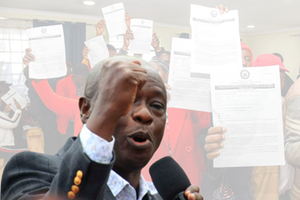Clash over age of consent for giving adolescents contraceptives

Data by the Ministry of Health shows one in five adolescents aged 15 to 19 is a mother or is pregnant with her first child. Kenya does not allow access to contraceptives for those below 18 years.
What you need to know:
- According to the policy, any child below the age of 18 years must get consent from parents or guardian before any contraceptive is given to them
The debate over the appropriate age of consent for contraceptive access gained significant traction in the just concluded Adolescents and Youth Sexual and Reproductive Health Rights conference held in Mombasa.
Health experts, lawyers, adolescents, church leaders and Ministry of Health officials have found themselves at odds over the age of consent, each group presenting compelling arguments for their positions.
The National Reproductive Health Policy 2020/2030 backs a conservative approach to contraceptives, stating that a child’s right to healthcare is the responsibility of the parent. According to the policy, any child below the age of 18 years must get consent from parents or guardian before any contraceptive is given to them.
According to adolescents, who were the majority of attendees at the 7th RNHK Adolescents and Youth Sexual and Reproductive Health and Rights conference, they do not need consent to have their preferred contraceptive and if this cannot be given out, then comprehensive sexual education will help. They said the policy is out of touch with their realities.
Janet Muthoni, a 17-year-old who is married and has a child, said she is a mother and not a child. "In the eyes of the government, I am a child, but I am married and I need to protect myself from subsequent pregnancies.”
"We are already engaging in sexual activities, whether adults want to acknowledge it or not. We need access to contraceptives to protect ourselves and make responsible choices. Whenever I go to hospital and produce an identification document, I am told to get consent from my parents before I am given contraceptives,” she said.
She added: “The message is clear: young people need autonomy over their bodies and access to the resources that ensure their well-being.”
One in every four girls in Kenya aged between 10 and 19 is either pregnant or has given birth to a first child, according to the National Council for Population and Development (NCPD)’s report in 2021.
“We have been reminded that adolescents and young people are not merely the leaders of tomorrow but the driving force of today yet their unique challenges in accessing comprehensive age-appropriate sexuality education, sexual reproductive services tailored to their unique needs across their diversities and the right to make an informed decision about their bodies are often overlooked and underrepresented,” said Ms Nelly Munyasia, executive director, Reproductive Health Network Kenya.
She added: “Through the conference, we have heard the voices of the young ones and I believe we should uphold a shared vision and a future where every young person across the African continent can enjoy their sexual reproductive health and rights.”
She said the strong conservative societal norms and legislation that hinder access to services for adolescents should be addressed.
“There is a need to amend and review policies that restrict access to Sexual Reproductive Health (SRH) information and services, particularly for those under 18 years. We need to push for full implementation and amendment of SRH policies and ensure adolescents and young people can access comprehensive SRH information and services without fear of criminalisation or stigma,” she said
Ms Maureen Oduor, gender equality and women empowerment advocate on
Sexual and Reproductive Health and Rights, said the confusion that has been brought by the policy is too much and that adolescents should be allowed to make choices about their bodies.
“We have so many cases of teenage pregnancies and social protection violations; and then we have the contraceptive restrictions. We need to have the young ones in mind while debating. Let us debate soberly without emotions on this matter,” she said.
Dr Monica Oguttu, founding executive director of Kisumu Medical and Education Trust, said the restriction reminds her of her old days at Kenyatta National Hospital decades ago when she was in charge of the maternity wing.
“I witnessed young girls come to the hospital in labour. Nobody ever asked and restricted them from getting the services. Then, things were more strict. Now, young girls are more sexually active and we are asking them about consent. Consent from who? She cannot even tell her mother that she is sexually active,” she said, adding: “We need to look at the reality and stop being emotional because that is why we are losing many young girls.”
On the other side of the debate, Ministry of Health officials urge caution and a more conservative approach. They highlight concerns about the country's values and the potential social and moral implications of lowering the age of consent for contraceptives.
The ministry's stance is also influenced by the need for comprehensive parental involvement and guidance.
Dr Edward Serem, head of division, Reproductive and Maternal Health at the Ministry of Health, said the government has come up with a booklet dubbed ‘Understanding Adolescents’ with help from the Ministry of Education and it is being rolled out in primary and secondary schools.
“We emphasise more on preventive and primary healthcare. When we talk about issues of pregnancy, can it be prevented? As we address the challenges that are already in our hands, which is providing adolescents with contraceptives without parental consent, we should be focusing more on prevention,” he said
He said the programme should be geared towards preventing pregnancies and not advocating for giving the young ones contraceptives.
“We need to end unwanted pregnancies and maternal deaths. We need to end HIV transmission by 2030. Enhancing awareness of SRH issues and how they can be averted is fundamental. The clock is ticking, it is time to end all the negative vices,” Dr Serem said.
Dr Jeanne Patrick who works at the Department of Reproductive Maternal Services, Ministry of Health, said values and the Constitution guide the country.
“We are guided by the Constitution, especially on SRH issues. I suggest to all of you to go and read the Children's Act on how we handle SRH issues. We have strong policies that support adolescents and programming including the policy which allows girls to go back to school after getting pregnant,” said Dr Jeanne.
“We have also come up with the SRH championship for behavioural change. The ministry has also developed a parental guide on how parents can guide their children to navigate teenagehood challenges,”
Dr Sheik Muhammed, director general of the National Council for Population and Development, said: “When having conversations regarding giving contraceptives to adolescents, we should be guided by laws and the Constitution.
“The age of consent is 18 years, which is constitutional, and it is not something that we can change. We need to focus on prevention. The young ones lack information and we need to educate them about the matters,” he said
Martin Onyango, a lawyer at the Center for Reproductive Rights, said the law entitles every person to healthcare services, including reproductive health services.
“Article 43 entitles every person to the right to healthcare. Article 53 specifically entitles children to the right to education and health.
“Article 27 of the Constitution prohibits discrimination whether based on age, sex or social extraction. Article 24 says that if you want to limit any of the rights granted in the Constitution, you can only do it in a law that specifically justifies why you are having the limitation in line with the Constitution,” he said.
“There is no law justifying why the government is prohibiting adolescents from accessing any healthcare services. The Constitution is the mother law binding all persons and all state organs at both levels of government. If the Ministry of Health is talking about any policy or law against this Constitution, then you are lying to the adolescents of this country,” he said
He added that the National Reproductive Health Policy undermines the Constitution.
Besides the Constitution, the Health Act sets the framework for access to healthcare and creates institutions for administering and providing it while addressing the issue of informed consent and the process through which any person receives healthcare.
“The framework for access to healthcare, including adolescents, is in section 8 of the Health Act.While addressing the user, it says, ‘where the user is a child and consent is required and if informing the guardian or parent is not in the best interest of the user, then the provider is required to provide service’,”said Mr Onyango.
He added: “In section 9, it talks about informed consent, which is only for specified services. It says that if minors requiring the informed consent of a guardian or parent is not in their best interest, the provider is required to provide care.
“For children who show up for care without the guardian, the provider is required to provide the care. The law has not changed, and the Constitution is very clear. No law prohibits a healthcare provider from providing services. It is misinformation and intimidation from a section of health officials,” Mr Onyango said.





